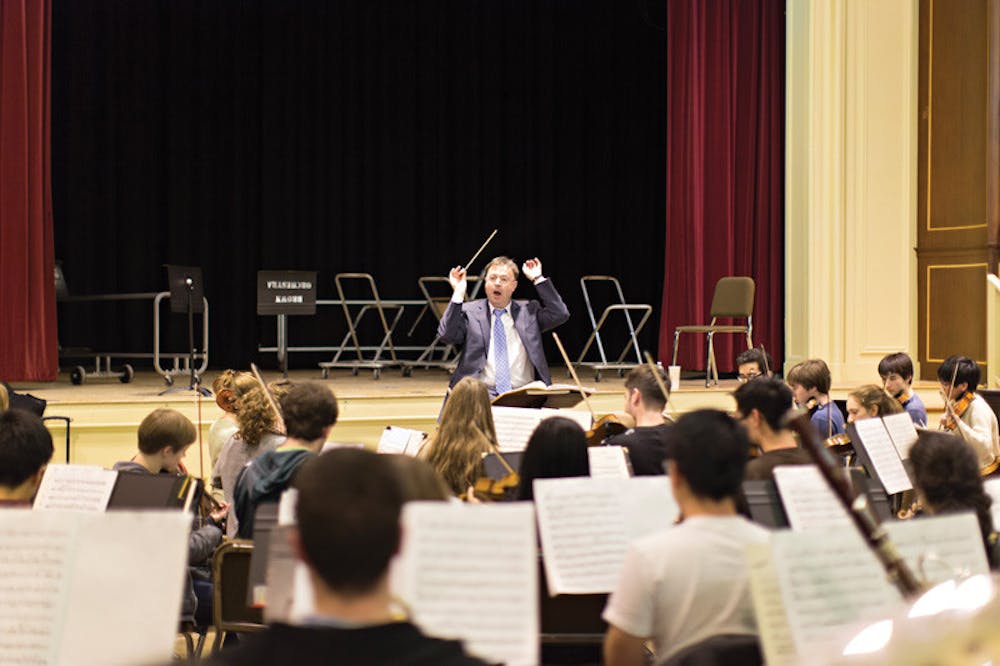The Brown University Orchestra’s Conductor Paul Phillips’ sabbatical this semester marks the third time in the past 25 years the orchestra is under a temporary baton. Taking his place on stage as conductor this semester is David Wroe — current music director at both the New Jersey Westfield Symphony Orchestra and New York City Teatro Grattacielo and former assistant conductor of the Boston Symphony Orchestra.
“Maestro Phillips has set a precedence of excellence which is hard to follow,” Wroe said, adding that he wants to match this standard while still helping orchestra members experience music in a new way.
Right in choosing Wroe
“It was left up to me to find someone to fill in for me,” said Phillips, senior lecturer in music and director of orchestra and chamber music.
Phillips searched for a replacement whose musical background was strong enough to support the growth of his students, and a professional colleague suggested Wroe. “In the end, David had the strongest professional credentials,” Phillips said, adding that Wroe possesses the organizational skills required for conducting the orchestra — a self-managed group.
“There is a depth of understanding that students and professors achieve under a piece of music,” Wroe said, explaining the appeal of conducting Brown’s orchestra. Wroe, who has experience conducting and directing orchestras in both the United States and Europe, said the pace of the professional field does not usually allow for the rewarding experience of interacting with students. This satisfaction makes Wroe’s occasionally lengthy commute — from his commitments in the tri-state area to campus — worth it, he said. “It is a pleasure to make it happen.”
Surprises and expectations
Having only worked under the direction of Phillips, students in the orchestra were initially a little apprehensive that his replacement may not live up to him, said Hannah Mirman ’14, student president of the orchestra. “Paul is really inspired about what he does and connects well with the musicians,” she added.
But when she and Rebecca Lichtin ’14, vice president of the group, met with Wroe for coffee before this semester’s first rehearsal, her concerns vanished, she said. “It’s been so easy and so wonderful interacting with him.”
Similarly, the caliber of the orchestra surprised Wroe, especially because its members are predominantly non-music majors. “I have been bulled over — and a number of other exclamatory phrases — by the high standards of Brown students and their high performance capabilities,” Wroe said. Brown students compare “very, very favorably,” to students of other groups he has conducted, he said.
Nevertheless, a new baton
“I am quite intense in the way I run rehearsal. My music-making is dramatic,” Wroe said. Conductors have the role of examining a piece of music and imparting their musical interpretations of it to the performers, he added. “My goal is that students are moved by the beauty and craftsmanship of music.”
Elizabeth Jean-Marie ’15 said Wroe has already made an impact. He asked the wind instruments to sit closer to the strings during rehearsal, she said, changing the dynamic of the ensemble. Now instead of focusing on only the conductor, we focus on playing with the people next us, she explained.
“It’s nice for the group to be under someone else’s baton for once,” Mirman said. Orchestra members can improve as musicians by working with more than one conductor, she added.
Wroe’s rehearsal style is a little more rigorous than Phillips’, Akshaya Avril-Tucker ’15 said. “But he is encouraging while he drills us,” she added. “He’s always telling stories or explaining to us a British metaphor of how to understand a piece.”
Luke Barker ’15 said that while Phillips ran through pieces during rehearsals, Wroe frequently gives recommendations on specific musical techniques. But overall, the rehearsal atmosphere is not too serious, and Wroe doesn’t have unrealistic expectations, Barker said. “He made it clear that he was very impressed by our diverse interests and respected us for that.”
“He is so open to connecting with us,” Mirman said, adding that after only four rehearsals, students have been able to establish trust in him — “already, we are sounding like a real ensemble.”

ADVERTISEMENT




